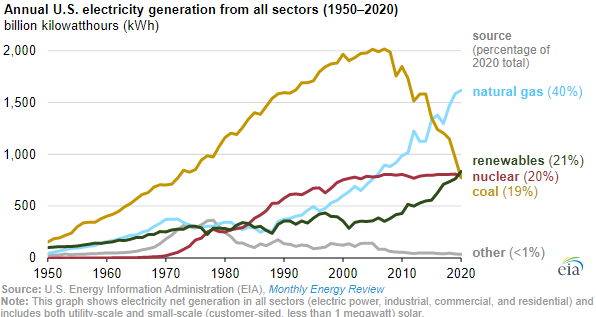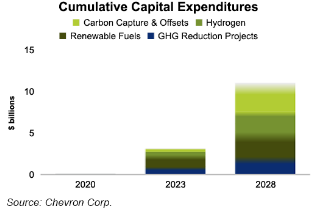In yesterday's ESG and Climate report, we looked at an extreme example of how the right support for clean fossil fuel use through a long period of energy transition, could create economic growth, support job growth, and not require subsidies – coal gasification to produce low-cost hydrogen. With the opposition to the “Build Back Better” bill, there is a clear opportunity for the fossil fuel industry to step up and suggest compromises, and we are seeing increasing interest in large scale CCS, despite its cost, in part because it is a path that will allow natural gas and other fossil fuels to meet increasing demand in a way that has a much lower carbon footprint, and in part, because it will still be cheaper than some of the heavily subsidized ideas to try and accelerate investments in renewable power that will inevitably fall foul of equipment and material shortages – something we have written about at length in past research – linked here. The EIA has already noted that coal use in 2021 has risen globally and it is likely that it will rise again, given the increasing demand for electric power and the lack of supply elasticity in the renewable power and natural gas-based systems – coal is a large part of the swing capacity these days. Many of the CCS projects proposed for the US are not much more than proposals today, but we are seeing some initial investment to prove that subsurface storage opportunities are feasible.
Is There A Place For Coal In Energy Transition?
Dec 23, 2021 12:35:22 PM / by Graham Copley posted in ESG, Hydrogen, Sustainability, Coal, CCS, Blue Hydrogen, Net-Zero, fossil fuel, IEA, carbon footprint, natural gas, energy transition, climate, carbon storage, Climate Goals, material shortages, clean fossil fuel, coal gasification, Build Back Better
CCS Can't Afford Long Pipelines
Dec 2, 2021 2:20:56 PM / by Graham Copley posted in ESG, Carbon Capture, CCS, Emissions, Carbon Price, Net-Zero, LCFS credit, climate, pipelines, carbon storage, carbon prices
In our ESG and Climate piece yesterday we briefly discussed the mid-west carbon capture projects, questioning their economic viability. Two of the most expensive components of any CCS project are pipelines and compression costs and we cannot see how a long network of pipe in the mid-west to pick up what are essentially small volumes can work economically. These projects are reliant on very high LCFS-like credits, and as we showed in last week’s report, LCFS credits have fallen this year and could fall further. The pipeline right of way issue is another major hurdle and we have seen growing resistance to pipelines of any sort over the last few years. Those who oppose CCS in principle could cripple these mid-west plans simply by co-opting enough land-owners on the path of the proposed pipelines and refusing access. We are supporters of CCS, but have done substantial work on economics and show that the process only begins to make economic sense if the sequestration is close to the emissions. Relying on possible artificially high carbon prices to justify the projects will only lead to pain, assuming the pipeline right of ways can be obtained.
Chevron: Working Hard, But Will It Be Enough?
Sep 16, 2021 2:57:56 PM / by Graham Copley posted in ESG, Carbon Capture, CCS, ESG Investing, ESG investment, Chevron, carbon storage
We focused on several aspects of carbon in our ESG and Climate report yesterday and we see several headlines today that focus on carbon and storage, whether it is the blue hydrogen project in France or the Chevron interest in CCS. Chevron has some experience with CCS with the Gorgon natural gas project in Australia and while the company has been criticized recently for falling short of its capture goals for the facility – we believe that all learning experiences are valuable, and what happened in Australia likely leaves Chevron better equipped than many to pursue successful projects going forward. The likely disappointment for Chevron will be the lack of investor appreciation that it may get for the initiatives, as the focus will remain on the scale of fossil fuel exposure – see our Sunday Piece from this week. The barrage of announcements from Chevron is likely in response to the investor pressure that the company (and the industry) is under, but as we discussed on Sunday, it may not make a difference – it did not for Shell in the eyes of the Dutch court.




